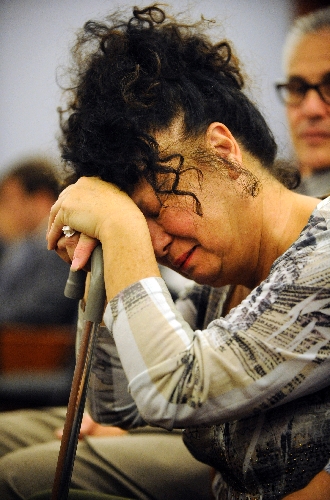Lawyers in hepatitis trial blame three firms, ask jury to award $25 million in damages

Lawyers for three people infected in Southern Nevada’s hepatitis C outbreak don’t deny that nurse anesthetists’ risky injection practices played a role in spreading the disease.
But in a product defect trial against the companies that made and sold the drug linked to the outbreak, lawyer Robert Eglet said Wednesday the outbreak wouldn’t have happened if the companies never gave medical professionals their "jumbo vials of mass infection" to misuse.
The companies, Teva Parenteral Medicines Inc., Baxter Healthcare Corp. and McKesson Corp., knew for years that their 50-milliliter vials of propofol were being reused among multiple patients, Eglet said. But they kept providing the large vials to clinics including the Endoscopy Center of Southern Nevada, the epicenter of the 2008 outbreak, he said.
"See no evil. Hear no evil. Speak no evil," Eglet said. "Turn a blind eye to it, don’t tell anybody about it, don’t do anything about it, because we’re making money off it."
In their closing arguments Wednesday after seven weeks of testimony, Eglet and Will Kemp asked a jury to award their clients a total of $25 million in compensatory damages.
The lawsuit filed by Anne Arnold, Richard Sacks and Tony Devito centers on the question of product liability. Their lawsuit alleged that medical professionals were tempted to misuse 50-milliliter vials of propofol to avoid wasting any of the liquid drug and that the drug companies should not have sold the large vials to endoscopy centers, where typical procedures require less than 20 milliliters.
Health officials blamed the outbreak on nurse anesthetists reusing vials of propofol on infected patients, contaminating the vials. The vials then were reused among different patients, spreading the infection.
Health officials linked nine hepatitis C cases to the clinic and a sister clinic. They labeled another 106 cases as "possibly linked," including those of Arnold, Sacks and Devito.
During closing arguments, Eglet and Will Kemp pointed to seven medical journal articles dating to 1995 that identified disease outbreaks linked to the misuse of large propofol vials among multiple patients.
Company executives also knew about the practice in the early 2000s, Eglet said. "They knew this misuse was going on, and they did nothing, nothing to stop it."
The patients’ lawyers said the drug companies made more money off larger vials, so they pushed their sale over safer, smaller vials.
The drug companies’ lawyers countered that their clients weren’t responsible for doctors or nurses who ignored safe practices and warning labels.
"The folks who are missing from the courtroom, they are solely the cause," Teva lawyer Mark Tully said.
Phil Hymanson, who represents Baxter and McKesson, said the case was about "going after deep pockets."
The drug companies provided medical professionals with the choice to buy whatever size they believed was appropriate. Any size vial is safe if it’s used properly, they said.
They also pointed out that there was no clear evidence how the hepatitis C was transmitted and that other methods, such as unclean endoscopes and reused medical equipment, could be to blame.
The Southern Nevada Health District’s investigation ruled out those other possibilities.
The drug companies knew their product was being misused but did nothing to stop it, and for that they should face punitive damages, Eglet said.
The jury will start deliberations today and decide whether to award punitive damages when it renders its verdict. During the first hepatitis outbreak-related trial, a jury’s verdict included $500 million in punitive damages against the drug companies. That award is under appeal.
Contact reporter Brian Haynes at bhaynes@reviewjournal.com or 702-383-0281.